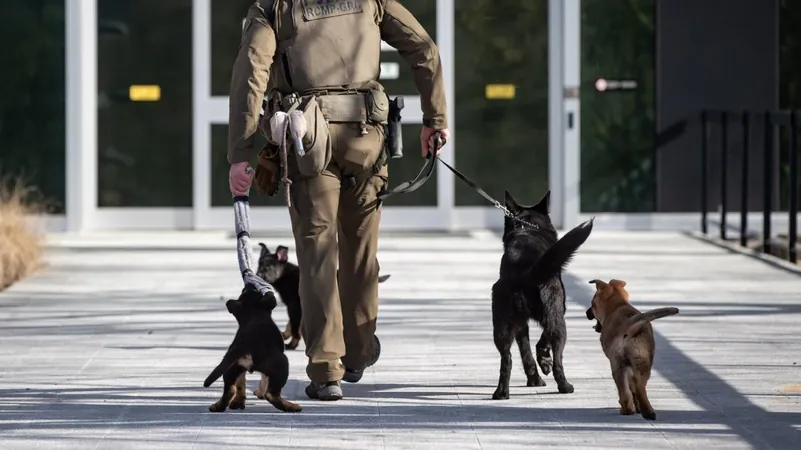
Troubling Issues in RCMP Police Dog Program Present Major Health Risks for Officers and Canines: Shocking Evaluation Reveals!
2024-12-14
Author: Sophie
Internal Review Highlights Major Problems
An internal review of the Royal Canadian Mounted Police (RCMP) police dog training program has unveiled startling problems that threaten the health and safety of both officers and their canine companions. According to the evaluation, the RCMP's training center has been struggling with significant staffing shortages, low morale, and deteriorating facilities, raising serious concerns about the well-being of everyone involved.
Evaluation Scope and Findings
The evaluation encompassed the governance and operation of the program from 2018-2019 to 2023-2024, relying on interviews and a comprehensive survey conducted across various RCMP divisions and the training center. Despite the program's rich history dating back to its inception in 1935 with the purchase of its first police dog, serious deficiencies were noted.
Dependence on Breeding Program
One critical finding is that the RCMP has increasingly depended on its own breeding program to source German Shepherds due to exorbitant prices and heightened demand. The breeding process begins with a rigorous seven-week evaluation to determine if puppies are suitable candidates for police work. Once selected, they are paired with handlers who undergo specialized training, but the imprinting and training processes are hindered by resource constraints and a lack of support for trainers.
Staffing Shortages and Overwhelmed Handlers
The review pointed out the inadequate staffing levels at the training center, where only 17 out of 26 positions were filled during the review period. Some staff expressed that even a fully staffed center would still require more personnel to meet the increasing demands of active policing. From 2005 to 2022, the number of trainers has barely increased from seven to eight, while the number of active dog teams surged from 125 to 157.
Health and Wellness Risks
Handlers often find themselves overwhelmed, with reports indicating a shortage of dog handlers to manage absences, requiring them to take equipment and dogs on vacations just to ensure coverage. The evaluation explicitly stated that 'the work environment and infrastructure within the training center pose significant health and wellness risks to employees and dogs.'
Psychological and Physical Health Concerns
Alarmingly, an audit conducted in early 2023 highlighted deficiencies in 11 out of 13 psychological factors crucial for a healthy work environment. Additionally, many handlers voiced their frustration with poor communication and management practices, which have severely impacted morale.
Stressful Conditions for Dogs and Handlers
Many handlers have opted not to house their police dogs at the facility in Alberta due to conditions that contribute to high stress levels and potential health risks for the animals. The kennels lack natural light and outdoor access, with loud noises during feeding and cleaning sessions further exacerbating stress. Health hazards identified included choking on peeling flooring, lead poisoning from ingesting paint flakes, and respiratory problems stemming from poor ventilation.
Safety Gear and High-Stress Responses
Field service teams are also susceptible to health risks. Responding to high-risk incidents, often in cooperation with emergency response units, they frequently lack essential safety gear like night vision goggles and protective helmets. This adds to the already high stress associated with the job, as handlers are often on call and working overtime.
Mental Health Support Recommendations
The toll on both physical and mental health has prompted suggestions from handlers for improved access to mental health support, including psychologists familiar with the unique pressures of their roles.
Call for Change and Future Improvements
In response to these alarming findings, evaluators proposed several recommendations aimed at improving health and safety, as well as streamlining the program's policies and sustainability. The RCMP management has committed to implementing numerous improvements over the upcoming year, focusing on addressing these critical issues.
Conclusion: Need for Immediate Action
This shocking report sheds light on the critical need to rectify the operating conditions of the RCMP police dog program, ensuring the well-being of both service members and their canine partners. As the situation unfolds, many are left wondering: how long can these systemic issues persist without drastic change? Stay tuned for updates that may shake the foundations of Canada's beloved police dog program!









 Brasil (PT)
Brasil (PT)
 Canada (EN)
Canada (EN)
 Chile (ES)
Chile (ES)
 España (ES)
España (ES)
 France (FR)
France (FR)
 Hong Kong (EN)
Hong Kong (EN)
 Italia (IT)
Italia (IT)
 日本 (JA)
日本 (JA)
 Magyarország (HU)
Magyarország (HU)
 Norge (NO)
Norge (NO)
 Polska (PL)
Polska (PL)
 Schweiz (DE)
Schweiz (DE)
 Singapore (EN)
Singapore (EN)
 Sverige (SV)
Sverige (SV)
 Suomi (FI)
Suomi (FI)
 Türkiye (TR)
Türkiye (TR)